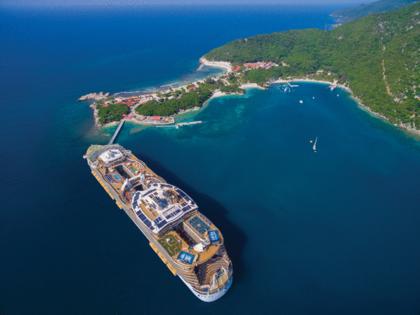Royal Caribbean's suspension of Labadee stop in northern Haiti is latest blow to country
Published in News & Features
Two days after Haiti’s transitional government approved a “war budget” to be partly funded with tax revenues to help fight gangs, the country’s treasury was hit with another blow.
Miami-based Royal Caribbean suspended operations to Labadee, its private destination off the coast of northern Haiti. Royal Caribbean’s sister line, Celebrity Cruises, had already removed Labadee from its itinerary weeks ago.
“Out of an abundance of caution, we have temporarily paused our upcoming visits to Labadee,” a Royal Caribbean spokesperson said in a statement. “We have already communicated with guests directly.”
On Tuesday night, Haitian vendors who depend on the few tourists still traveling to Haiti were notified of the decision. This is the second time in less than 12 months that Royal Caribbean has decided to remove Haiti from its Caribbean stops. Last summer, it suspended visit to Labadee through September 2024.
While the cruise line did not provide details for either decision, Royal Caribbean’s latest move comes just over a week after Haiti’s transitional government declared a nationwide state of emergency. A source familiar with the situation said while northern Haiti isn’t being overrun by criminal gangs like the capital of Port-au-Prince, the state of emergency declared from April 8 to May 8 in response to the violence doesn’t help.
Further fueling concerns are recent security alerts from the U.S. Embassy in Port-au-Prince about widespread protests with the potential for violence. Haiti has for several years been under a Level 4 Do Not Travel warning from the U.S. State Department, citing kidnappings, crime, civil unrest and limited health care.
Cruise ship passengers have been among the few tourists Haiti has continued to received since an alarming rise in gang violence prompted airlines to cancel flights and twice last year forced the closure of its main international airport, Toussaint Louverture, in Port-au-Prince. Data provided to the Miami Herald show that the closures last year and an ongoing Federal Aviation Administration ban on U.S. jetliners landing at Toussaint Louverture shows there were fewer than 180,000 airline travelers to Haiti last year. By comparison, the country had more than a million airline passengers in 2018.
Though Haiti’s finance ministry did not respond to requests about how much the country has lost in airport revenue, it has one of the highest taxes on airline tickets, at $100 each, and all travelers who cannot prove they were born in Haiti are charged a separate $10 tourist tax.
The violence in the capital, which has spread to parts of central Haiti, has led to one of the worst humanitarian crises in the region and in recent days has led a number of foreign governments to issue warning to gangs and their allies about reports they are planning to destabilize the transitional government.
On Sunday, the State Department joined leaders of the 15-member Caribbean Community, CARICOM, in warning against any attempts to take the over by force. On. Wednesday, the United Kingdom and France issued a similar joint statement.
“We are committed to maintaining pressure on those who seek to destabilize Haiti via the implementation of sanctions, and we call on authorities to fully implement the sanctions regime in Haiti,” the countries said in a joint statement.
The statements came as Haitians prepared to take to the streets to demonstrate against the violence and the ruling transitional government. But hours into the protest, its organizer, a member of the self-defense brigade for the capital’s Canape-Vert neighborhood and a cop assigned to the unit at the National Palace, suddenly stopped the march, telling the crowd that he had information there were 300 individuals who were prepared to attack the crowds.
_____
(Miami Herald staff writer Vinod Sreeharsha contributed to this report.)
_____
©2025 Miami Herald. Visit miamiherald.com. Distributed by Tribune Content Agency, LLC.







Comments